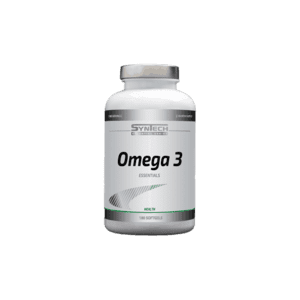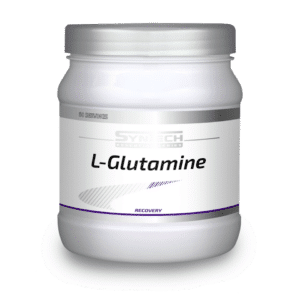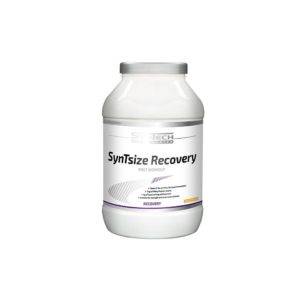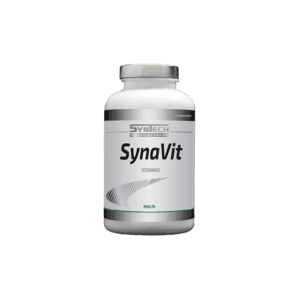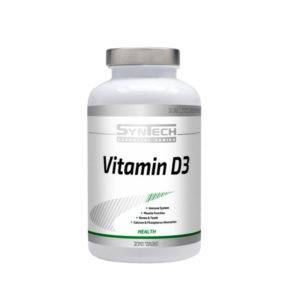Syntech Vitamin D3 | 270 tabs
€13.02
Vitamin D is often referred to as the “sunshine vitamin” because the body produces Vitamin D itself when the skin is directly exposed to sunlight. The ultraviolet B rays from the sun are absorbed by the cholesterol in the skin, and quickly converted into Vitamin D3 (cholecalciferol). Vitamin D3 is then transported to the liver and converted to calcifediol (25(OH)D). To determine a person's vitamin D status, these 25(OH)D serum levels are measured in the blood.
About 50% of the population worldwide suffers from deficient Vitamin D levels, and it affects all ethnic groups and all ages. There are several factors that determine whether someone has a Vitamin D deficiency. Influencing examples: the season of the year, lifestyle (indoor or outdoor activities), latitude and/or location where a person lives, skin color, age, use of sunscreen etc.
Vitamin D is rarely found in regular food, so supplementation can help.
Gratis verzending vanaf €75!
- Voor 17:00 besteld, dezelfde dag verzonden
- 14 days return
- Shop nu betaal later met Klarna
The pro's of Vitamin D:
- Contributes to the maintenance of normal bones.
- Contributes to normal levels of calcium in the blood.
- Contributes to the normal function of the immune system.
- Contributes to the maintenance of normal teeth.
- Contributes to general health in the context of the cell division process.
The pro's of Vitamin D for athletes:
- Contributes to the maintenance of muscle function and muscle strength.
- Can contribute to an improvement in sports performance.
- Reduces the risk of bone fractures.
- Reduces the risk of inflammation
Suitable for:
- Persons who do not get enough direct sunlight.
- During the winter months: individuals and athletes living above the 35th parallel (Europe, North America, Russia)
- All indoor athletes
The active ingredients per daily serving (3 minitabs)
- 75µg (3000 IU) Vitamin D3
Scientific References:
- Rathish Nair, Arun Maseeh. Vitamin D: The "sunshine" vitamin. J Pharmacol Pharmacother. 2012 Apr-Jun; 3(2): 118–126.
- European Food Safety Authority. Vitamin D contributes to the maintenance of normal bones. EFSA Journal 2009;7(9):1227 and 2009;7(9):1272..**
- European Food Safety Authority. Vitamin D contributes to normal absorption of calcium and phosphorus. EFSA Journal 2009;7(9):1227 and 2011;9(6):2203.**
- Jennings A et al. A Mediterranean-like dietary pattern with vitamin D3 (10 µg/d) supplements reduced the rate of bone loss in older Europeans with osteoporosis at baseline: results of a 1-y randomized controlled trial. Am J Clin Nutr. 2018 Sep 1;108(3):633-640.
- European Food Safety Authority. Vitamin D contributes to normal blood calcium levels. EFSA Journal 2009;7(9):1227 and 2011;9(6):2203.**
- Weaver CM et al. Calcium plus vitamin D supplementation and risk of fractures: an updated meta-analysis from the National Osteoporosis Foundation. Osteoporos Int. 2016 Jan;27(1):367-76.
- Battault SA et al. Vitamin D metabolism, functions and needs: from science to health claims. Eur J Nutr. 2013 Mar;52(2):429-41.
- European Food Safety Authority. Vitamin D contributes to the normal function of the immune system. EFSA Journal 2010; 8(2):1468.**
- European Food Safety Authority. Vitamin D contributes to the maintenance of normal teeth. EFSA Journal 2009;7(9):1227.**
- Hossein-nezhad A, Holick MF. Vitamin D for health: a global perspective. Mayo Clin Proc. 2013 Jul;88(7):720-55.
- European Food Safety Authority. Vitamin D has a role in cell division. EFSA Journal 2009;7(9):1227.**
- European Food Safety Authority. Vitamin D contributes to the maintenance of normal muscle function. EFSA Journal 2010; 8(2):1468.**
- Chiang CM et al. Effects of Vitamin D Supplementation on Muscle Strength in Athletes: A Systematic Review. J Strength Cond Res. 2017 Feb;31(2):566-574.
- Wyon MA et al. The influence of winter vitamin D supplementation on muscle function and injury occurrence in elite ballet dancers: a controlled study. J Sci Med Sport. 2014 Jan;17(1):8-12.
- Hamilton B et al. Vitamin D deficiency is endemic in Middle Eastern sportsmen. Public Health Nutr. 2010 Oct;13(10):1528-34.
- Close GL et al. Assessment of vitamin D concentration in non-supplemented professional athletes and healthy adults during the winter months in the UK: implications for skeletal muscle function. J Sports Sci. 2013;31(4):344-53.
- Cannell JJ et al. Athletic performance and vitamin D. Med Sci Sports Exerc. 2009 May;41(5):1102-10.
- Ceglia L. Vitamin D and its role in skeletal muscle. Curr Opin Clin Nutr Metab Care. 2009 Nov;12(6):628-33.
- Larson-Meyer DE, Willis KS. Vitamin D and athletes. Curr Sports Med Rep. 2010 Jul-Aug;9(4):220-6.
- Larson-Meyer DE. The importance of Vitamin D for Athletes. Sports Science Exchange. 2015. Vol. 28, no. 148, 1-6
- Barker T et al. Vitamin D sufficiency associates with an increase in anti-inflammatory cytokines after intense exercise in humans. Cytokine. 2014 Feb;65(2):134-7.
- Willis KS et al. Vitamin D status and biomarkers of inflammation in runners. J Sports Med. 2012 Apr 27;3:35-42.
- Jung HC et al. Vitamin D₃ Supplementation Reduces the Symptoms of Upper Respiratory Tract Infection during Winter Training in Vitamin D-Insufficient Taekwondo Athletes: A Randomized Controlled Trial. Int J Environ Res Public Health. 2018 Sep 14;15(9).
- Martineau AR et al. Vitamin D supplementation to prevent acute respiratory tract infections: systematic review and meta-analysis of individual participant data. BMJ. 2017 Feb 15;356:i6583.
How to use:
Take 3 tablets (= 1 serving) with a meal. Vitamin D is a fat-soluble vitamin, so it is important to take the tablets with a meal. This way it is much better absorbed by the body.
Vitamin D3 is taken in micrograms and so you actually need very little substance to get the daily amount. SynTech chose to use a minimum of additives to make the tablet and therefore the tablets are Vitamin D3 so small. Don't be shocked when you open the jar, all 270 tablets are in it!


